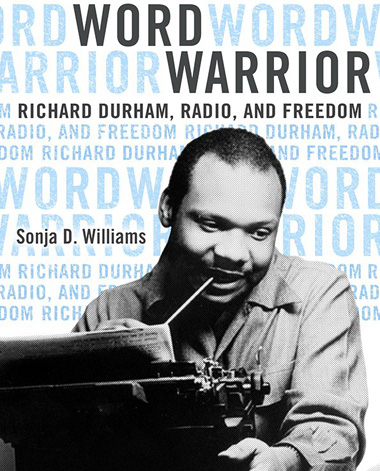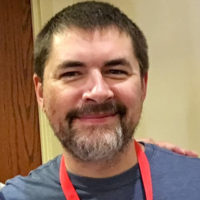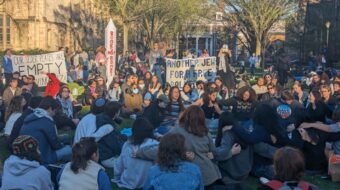
In a world of 24 hour news, instantaneous information, social media, and Twitter, it is imperative that we slow down and learn about pioneering progressive media personalities, their histories, struggles, and the context of their times – especially, if we hope to help create, sustain and grow a democratic media, a diverse media, a grassroots peoples’ media.
Richard Durham is one of those pioneering media personalities and Sonja D. Williams’ Word Warrior: Richard Durham, Radio, And Freedom is a remarkable contribution to the historical narrative, to our understanding of the long civil rights revolution.
Williams, a professor of media, journalism, and film at Howard University, isn’t simply an academic observer, writing about Durham from a distance. She is the winner of three George Foster Peabody Awards as a radio producer for NPR and PRI; her credits include the radio series Wade in the Water: African American Sacred Music Traditions and Black Radio: Telling It Like It Was, among others.
Williams’ hands-on experience as an African American woman in a white male-dominated industry undoubtedly adds nuance and depth to Durham’s remarkable story. Durham’s struggle as an African American man fighting against racism – within the confines of a profit driven corporate media structure – is not only articulated as a tangible, concrete individual career goal, but also as a peoples’ aspiration, as part of the long struggle for African American equality and civil rights.
Durham, born in 1917 Mississippi, spent his formative years in Chicago. By his late teens and early twenties, he had begun to view literature, poetry and radio – the most important, most popular media of the times – as a potentially liberating force.
Influenced by the Chicago South Side Writers Group, a lose network of about twenty young writers lead by then-Communist Party, USA member Richard Wright, Durham would eventually join the CPUSA and write for Party-influenced publications, like New Masses, the Chicago Defender and Chicago Star. Ever an industrious go-getter, Durham wrote his favorite poet, Langston Hughes, seeking his advice and eventually forging a longstanding friendship.
By the late 1930’s, Durham began working for the Works Progress Administration- funded Illinois Writers’ Project where he authored the chapter “Don’t Spend Your Money Where You Can’t Work” in The Negro Press in Chicago, an examination of the city’s past and present 34 Black newspapers and 11 magazines.
As Williams’ notes, “Durham had to be excited about focusing on the interconnectivity between race, economics, and media for his first IWP assignment.” Further, during this time Durham “likely found” the Communist Party’s “aggressive attempts to stop housing evictions, organize workers, and integrate labor unions to be what historian Mary Helen Washington called ‘beacons of light’ for Chicago’s struggling black population.”
Durham undoubtedly weaved a tapestry of interconnected struggles and saw the CPUSA, media in general and radio in particular, as a connective tissue with the potential to help forge a Black-white alliance and tear down racial barriers. By the early 1940’s Durham had become active in the Communist Party-led National Negro Congress, which “boldly campaigned against lynching, voting restrictions, and employment inequalities,” where he met his future wife, Clarice.
The writer-activist wrote his first radio script, dated June 23, 1940, for WAAF’s Legends of Illinois series. By 1944, Durham was working full-time as a reporter for the Chicago Defender, whose national editor was a former CPUSA member, Ben Burns, described by one historian as “the best kept and strangest secret in the history of interracial American radicalism.”
Durham’s “first major assignment” for the Defender was in the segregated South. Sent to Memphis, Tenn., Durham interviewed Memphis’ one-term mayor, Edward R. Crump, who had never before granted an interview “to a Negro reporter…” Known as “the Southern dictator,” Crump was grilled on his views of civil rights, the poll tax, etc. Durham would also cover the “All-Nations Conference in San Francisco,” a “historic gathering [that] served as the launching pad for a new organization called the United Nations…,” among others.
By 1946 the Defender had decided to launch a 15-minute local radio drama series, called Democracy USA, which Durham and another writer were initially tasked with scripting. However, before the first episode was complete Durham was fired by the owner, John Sengstacke, supposedly for supporting a political candidate Sengstacke opposed.
According to Williams, “Durham’s firing had a lot more to do with his in-house activism…[He] had stubbornly lobbied for better working conditions and more equitable pay for the Defender‘s writing staff through the American Newspaper Guild. Durham became an active ANG member and pushed the Defender to honor union policies and increase wages.” Burns, who had also been organizing with the ANG, was fired too due to union activity.
Shortly after his firing, Durham started working for the progressive newspaper the Chicago Star (which the FBI claimed was “dominated and controlled” by the CPUSA), where he contributed articles about housing disparities, labor issues and workers’ rights. The Star did include well know communists on its editorial board, including William Sennett, Carl Hirsh and Frank Marshall Davis, mentor of future president Barak Obama. Soon, Durham would return to scripting Democracy USA, which would become a huge success.
In 1947 the National Negro Congress published a damning study of African Americans in the media. It found that Durham “might have been the only Negro writer working full time in radio.” Further, the study claimed, “Of radio’s 30,000 white-collar jobs – the medium’s largest employment block – Negroes held no more than two hundred positions.”
By 1948, Durham was leading two more radio shows Here Comes Tomorrow, “the first authentic radio serial of an American Negro family,” and Destination Freedom, a half-hour drama “about the lives and contributions of prominent Negro History makers – freedom fighters all…” Destination Freedom episodes included segments in notable African American pioneers like Harriet Tubman, Denmark Vesey, Frederick Douglas and Sojourner Truth, among others – all in the late 1940’s, a decade before the emergence of the civil rights movement.
By the early 1950’s, Durham would change careers and begin a short stint with the United Packing House Workers of America, serving as the union’s Anti-Discrimination Department coordinator. He would also author a 21 page union booklet titled Action against Jim Crow: UPWA’s Fight for Equal Rights. Later, Durham would be removed from his union position for supporting a failed change in leadership.
Richard Durham is an amazing figure, a media pioneer who fought for equality, workers’ rights and socialism; it is impossible to tell his full story within the confines of a short review. Sonja Williams has accomplished a tremendous task by authoring his biography. Word Warrior is highly recommended to everyone interested in African American, labor and media history.
Word Warrior: Richard Durham, Radio, And Freedom
By Sonja D. Williams
University of Illinois Press, 2015, 264 pages












Comments